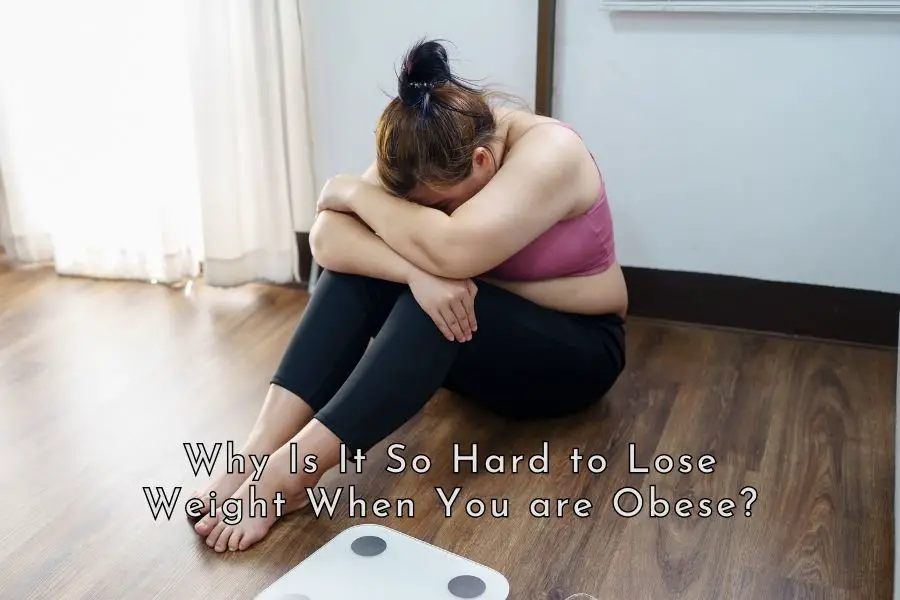If you are obese and find it hard to lose weight, don’t blame yourself because, in today’s environment, there are many factors working against you.
This post will explore seven underlying reasons why it is very hard for obese people to lose weight.
Understanding these reasons is important because it can help you develop effective strategies for successful weight loss.
1. You Are Given the Wrong Weight Loss Advice
You might find it hard to lose weight because you’ve been given the wrong dietary advice.
For example, you may have been advised to follow a low-fat diet because fat is a lot more calorie dense than carbohydrates.
It is true that one gram of fat provides 9 calories, whereas one gram of carbs provides only 4 calories. However, while this advice sounds logical and might work in the short term, strictly adhering to a low-fat, high-carbohydrate diet can lead to blood sugar spikes and increased insulin levels. Insulin is a hormone that promotes fat storage. Consequently, high-carbohydrate foods can hinder fat burning rather than facilitating it. When you are trying to lose weight, what you eat and how it affects your hormones is generally more important than total calorie intake.
Moreover, it’s important to note that carbohydrate-rich foods can be highly addictive, often leading to difficulties in portion control. Have you ever wondered why it’s challenging to stop at just one cookie or one slice of pizza but it’s very hard to overeat meat? The addictive nature of carbohydrate-rich food can contribute to consuming more calories than intended, making weight loss more challenging.
A meta-analysis of 17 randomized controlled trials with 1,797 patients found that a low carbohydrate diet was associated with modest but significantly greater improvements in weight loss and predicted risk of atherosclerotic cardiovascular disease than a low-fat diet. This suggests that adjusting carbohydrate intake can have a positive impact on weight loss outcomes and cardiovascular health. [1]
Another common weight-loss advice you might have come across is calorie restriction, which suggests that you should eat less and move more in order to lose weight. [2]
While it is true that initially restricting calories may lead to weight loss, your body has a built-in survival mechanism. When it senses a decrease in calorie intake, it can lower your metabolic rate to conserve energy. This adaptive response can result in reaching a plateau shortly after starting a calorie-restricted diet, making it increasingly difficult to continue losing weight. [3]
Weight Loss Strategies
In our view, the two diets that are best to help an obese person lose weight are the ketogenic diet and the carnivore diet. They are both low in carbohydrates, high in fat, rich in nutrients and support fat burning rather than fat storage like a low-fat diet.
If you want to try out these diets to see if they can help you lose weight, make sure to make good quality animal-based foods like beef, lamb, goat, bison and eggs the core of your diet and stick with fresh and unprocessed food.
Furthermore, an alternative weight-loss strategy that may be more effective than traditional calorie restriction is fasting (intermittent fasting or periodic fasting). According to Dr. Jason Fung, a Canadian nephrologist and world-leading expert on intermittent fasting and low carbs, your appetite goes down while your energy expenditure goes up during fasting and your body does not go into the survival mode similar to what occurs with consistent severe calorie restriction.
2. You Have Leptin Resistance
Leptin resistance is a key factor in the development of obesity. [4]
When you are obese, you are likely to have leptin resistance, a condition where leptin signaling is compromised resulting in higher food intake and lowering energy expenditure. This makes it extremely hard for an obese person to lose weight.
Leptin is a hormone produced by fat cells in the body, and its production is proportional to the amount of fat stored. When there is sufficient fat storage, high levels of leptin signal the hypothalamus in the brain that there is no need for further food intake, resulting in decreased feelings of hunger. [5]
However, as the body starts utilizing its stored fat, leptin levels decrease, triggering a signal to the brain that more food should be consumed. This decrease in leptin levels can lead to an increase in food cravings. [6]
These mechanisms represent the normal functioning of leptin in healthy individuals. In cases of leptin resistance, these signals become disrupted, resulting in difficulties regulating appetite and weight.
In particular, in obese individuals, prolonged overeating can lead to an elevation in circulating leptin levels. When the hypothalamus is repeatedly exposed to high levels of leptin, it can result in detrimental effects and a reduced sensitivity to the hormone, known as leptin resistance. [7]
When you have leptin resistance, the normal signaling process is broken and your brain no longer responds to leptin. You may have a very high level of leptin in your body due to high fat storage but your brain is not listening. Unable to recognize that there is a high level of leptin already, your brain mistakenly thinks you are starving and sending out signals that you need to eat more. As a result, leptin resistance makes you feel hungry and want to eat all the time.
Needless to say, for individuals with obesity, having a hormone in the body telling them to eat all the time makes it extremely hard to lose weight.
Dietary interventions, including fasting, energy restriction, and the switch from high fat to low-fat diets, induce leptin resensitization. [8]
As carbohydrates trigger insulin secretion and promote fat storage, for an obese person with leptin resistance, a diet that is high in protein, low or moderate in fat, and low in carbohydrates can help reverse leptin resistance and support weight loss.
3. Your Body Naturally Resists Weight Loss
Another reason why it is so hard for obese people to lose weight is that they have to fight not only their cravings but also their own bodies’ inertia.
If you reduce your calorie intake significantly, you might experience substantial weight loss initially. But your weight loss will then plateau and you’ll become extremely frustrated because you can’t lose any more weight or only lose a very small amount relative to your effort.
This is because when your body senses the calorie reduction, its biological drive to regain the lost body mass to survive kicks in. That is, it metabolically adapts to a lower number of calories coming in and goes into preservation mode, resulting in fewer calories being expended, i.e. a lower basal metabolic rate. [9]
This was what some Biggest Loser contestants experienced. While 14 participants on one of the show’s seasons lost on average 58 kg (128 pounds) at the end of the competition, their resting metabolic rate decreased by 610 kcal/day. Six years later, they regained on average 41 kg (90 pounds) but their resting metabolic rate was still 704 kcal/day below the baseline. [10]
While metabolic adaptation is very useful for your survival if you were to live in the wilderness like our ancestors once did, clearly, it is not helpful at all when you are trying to lose weight in today’s environment
In addition to lower resting metabolic rate, your appetite also goes up, you often feel hungry and in such a state, you are less likely to be physically active, further compromising your weight loss effort.
Weight Loss Strategy
One effective strategy to counteract the body’s adaptive mechanisms and support weight loss is to combine fasting with a diet that emphasizes high-quality protein intake, accompanied by muscle-building exercises.
As mentioned above, intermittent fasting does not lower the resting metabolic rate. Therefore, eating less frequently and extending the fasting period could be one way to control calorie intake and maintaining a healthy metabolic rate at the same time.
A diet high in quality proteins can further boost your metabolism because proteins have a much higher thermic effect (i.e. the energy your body spends to digest proteins) compared to carbohydrates and fats. This increased energy expenditure can help boost your metabolism and support weight loss. [11]
Additionally, engaging in muscle-building exercises can help increase your muscle mass which has the effect of increasing your metabolic rate. Muscles are more metabolically active than fat and other tissues, meaning they burn more calories even at rest. By increasing your muscle mass, you can elevate your basal metabolic rate and enhance your body’s ability to burn calories. [12]
4. The Environment You Live in Does not Support Weight Loss
The environment we live in today makes it especially hard for an obese person to lose weight. We will explore the main reasons for this below. [13]
(i) The availability of unhealthy calorie-dense food
It is very hard to lose weight when everywhere you go, there is an abundance of unhealthy and calorie dense-food available 24/7.
If you look at what is available in supermarkets, convenience shops, takeaways, sports arenas, cafes, and even fine-dining restaurants, you are likely to see that a very high proportion of the foods on offer are highly processed, high in fat, salt, and sugar and extremely high in calorie content.
While portion sizes served in popular fast-food outlets, takeaways, and family-style restaurants tend to be excessively large, many of these food options also have little or no nutrition.
If you seriously want to eat more healthily and lose weight, you will have to take control of your food choices and learn to cook for yourself. However, unfortunately, in today’s fast-paced world, many of us are time-poor, making this goal very difficult to achieve.
(ii) Improved transportation reduces physical activity
An undesirable effect of improvements in urban transportation is the reduction in transport-related physical activity.
We rely more on cars than ever to commute to schools, workplaces, and entertainment venues.
Urban developments also mean lower walkability in some communities while the increase in crime rates in some areas forces people to remain indoors more and reduce their physical activities.
(iii) Work environment and advances in communication technologies
The tremendous advancement in technologies in the last few decades means that the majority of us in the industrialized world are doing much less physical work both at home and at work.
For many of us, our work involves sitting long hours at our desks, in front of a computer.
We also use a lot of labor-saving devices at home in our daily chores.
Our entertainment activities are increasingly screen-based and hardly require any serious physical activities.
The end result is, while our calorie intake increases and the quality of our foods decreases, the level of our physical activities also decreases significantly. In this environment, it is no surprise that it is extremely hard for an obese person with a lot of stored fat to lose weight.
Weight Loss Strategy
Knowing that you are in an environment that is not very supportive for obese people who are trying to lose weight, you can develop appropriate strategies to help you lose weight more successfully such as:
- Learn to cook for yourself and pack your own lunch rather than eating out. Every meal should be a high protein, moderate to low fat and low carb. If you can’t go full carnivore or zero-carbs, a few slices of steaks paired with a salad or a bowl of meat stew with some steamed low-carbs vegetables are perfect for weight loss
- Choose the healthiest food choices available when you do have to eat out. A couple of slices of roast beef and small salad is much better than fish and chips or pasta bolognese
- Empty your pantry and fridge of all food that is processed, high in carb, and calorie dense and void of nutrients such as fruit juice, crackers, biscuits, ice cream and restocking them with whole or minimally processed food that are nutrient-dense. If they are not there, you can’t be tempted to eat them
- Keep a record of your physical activities for a week and identifying all opportunities where you can be more physically active, e.g. 15 minutes walk in the morning, standing up more at work, taking a stroll after lunch, stretching while watching TV or mowing your own lawn instead of hiring
- See if you can change job to a more physically active one or swap your car for a bike or even walk to work
- Find a hobby that you need to be physically active and reduce the time you spend in front of the screen, e.g. woodworking, dancing, or bike-riding.
5. You Are Genetically Predisposed to Weight Gain
If you are genetically predisposed to weight gain, you might find it much harder to lose weight than other people.
Scientists have identified many genes that can make people more prone to gaining weight. Obese genes can affect people’s appetite, metabolism, and body fat distribution. [14]
If you come from an overweight or obese family and have been overweight or obese all your life and struggle to lose weight, you might be carrying obese genes. [15, 16]
However, carrying obese genes does not mean you should resign to living with obesity for the rest of your life.
As the saying goes, “genetics loads the gun but the environment pulls the trigger”. Genetics certainly hasn’t changed much since the 1960s but the obesity rate in America has shot up from 13% in the 1960s to around 34% today. [17]
Weight Loss Strategy
By changing the environment you live in to the extent that you can control, you can definitely make a difference to the number on the scale.
As mentioned above, there is a number of simple but effective changes you can make to your own environment to help you lose weight. For example:
- What food you buy when you go shopping and what kind of food you keep in your house
- How many times you eat out and what food you order when you eat out
- How you commute to work, shops, and entertainment venues
- How you spend your leisure time.
These choices can all have an impact on your weight and your health.
6. You Have Medical Conditions and Take Medications That Cause Weight Gain
Some medical conditions and medications may cause weight gain and, if not resolved, will make it difficult for overweight or obese people to lose weight. [18, 19, 20]
(i) Diabetic treatment
Patients who take insulin to manage their diabetes are more likely to snack or eat more to prevent lower blood sugar levels. This leads to an increase in calorie intake which translates to weight gain.
(ii) Steroid treatment
Steroids are commonly used in the treatment of asthma and arthritis and some other conditions. Long-term use of steroids affects areas in the brain that control feelings of hunger and satiety and lead to an increase in appetite and hence weight gain.
(iii) Cushing syndrome
Cushing syndrome is a disease that develops as a side effect of tumors and the use of steroid treatments.
This condition causes high levels of the cortisol hormone which is a hormone associated with various body functions such as the immune system, digestion, and also controls metabolism.
Higher levels of this hormone lead to overeating and weight gain especially in areas around the chest, face, and stomach.
(iv) Hypothyroidism
Hypothyroidism is a condition of underactive thyroid glands that leads to the body’s inability to produce sufficient thyroid hormones.
Thyroid hormones are responsible for the metabolism and regulation of energy consumption by the body. Lower levels of this hormone lead to a slow metabolism.
(vi) Polycystic ovary syndrome (PCOS)
PCOS is a hormonal condition that affects women of childbearing age. PCOS affects a woman’s ovary and can cause symptoms such as irregular periods, infertility, excess hair, and weight gain. The exact cause of PCOS is unknown, but it’s thought to be hormone-related, resulting in too much insulin and testosterone.
(v) Stress and anxiety
Obese people are likely to have poor body image and this can mean suffering from chronic stress, anxiety, and depression. All these can make it hard to lose weight because stress raises cortisol and consistent stress means elevated cortisol levels and this has been linked to weight gain.
(vi) Medications
Some medications may cause weight gain because they stimulate appetite, affect your metabolism, or cause your body to retain water.
Medicines that may cause weight gain include:
- Medicines for diabetes, such as insulin, thiazolidinediones, and sulfonylureas
- Antipsychotic medicines such as haloperidol, clozapine, risperidone, olanzapine, quetiapine, and lithium
- Antidepressant medicines like amitriptyline, imipramine, paroxetine, escitalopram, citalopram, mirtazapine, and sertraline
- Epilepsy medicines like valproate, divalproex, carbamazepine, and gabapentin
- Steroid hormone medicines like prednisone or birth control pills
- Blood pressure-reducing medicines like beta-blockers such as propranolol and metoprolol.
Weight Loss Strategy
If you have those medical conditions or currently take the above medications, talk to your healthcare provider and find ways to treat the root causes of your problems, and see if you can get off medications. In most cases, modern medications only treat symptoms and do nothing to address the causes.
Please don’t be afraid to ask questions. Nobody cares about your health more than you do.
Don’t take no for an answer. Your body has an amazing ability to heal if it is given the right conditions.
If your usual doctor can’t help you, find a functional medicine practitioner. Unlike conventional doctors who are trained to diagnose and write prescriptions, functional medicine practitioners are trained to find out the causes of your complex health problems and use a holistic approach to help you get better.
7. Social Stigma and Discrimination Discourage Weight Loss Efforts
Obese people are often blamed for their own weight problems and face discriminatory behaviors from people with normal weight. Their lack of understanding of many obstacles that obese people face in trying to lose weight causes them to think that their behaviors may motivate obese people to adopt healthier behaviors.
However, this sort of behavior is found to have negative implications for their psychological and physical health and does not help motivate obese people to lose weight. [21]
A number of studies have found that experiencing weight stigma increases the likelihood of engaging in unhealthy eating behaviors and lower levels of physical activity, both of which exacerbate obesity and weight gain. [22]
Weight Loss Strategy
Other people’s behaviors are something that you cannot control.
The best thing you can do is ignore those people and focus your energy on making positive changes in your health and your life.
Surround yourself with people who genuinely care about you and fully support your journey to better health and well-being.
Other posts you might be interested in:
Three Science-Backed Strategies for Fast Weight Loss
The Best and Most Healthy Way to Lose Weight and Keep It Off
What Is the Best Diet for an Obese Person to Lose Weight?
Best Exercises to Help an Obese Person Lose Weight
Can You Be Overweight or Obese and Healthy at the Same Time?
How to Lose the Last Few Pounds on the Carnivore Diet?
How to Avoid Weight Gain During the Holidays
Disclaimer: The information in this post is for reference purposes only and is not intended to constitute or replace professional medical advice. Please consult a qualified medical professional before making any changes to your diet or lifestyle. Please check out our disclaimer for more detail.





